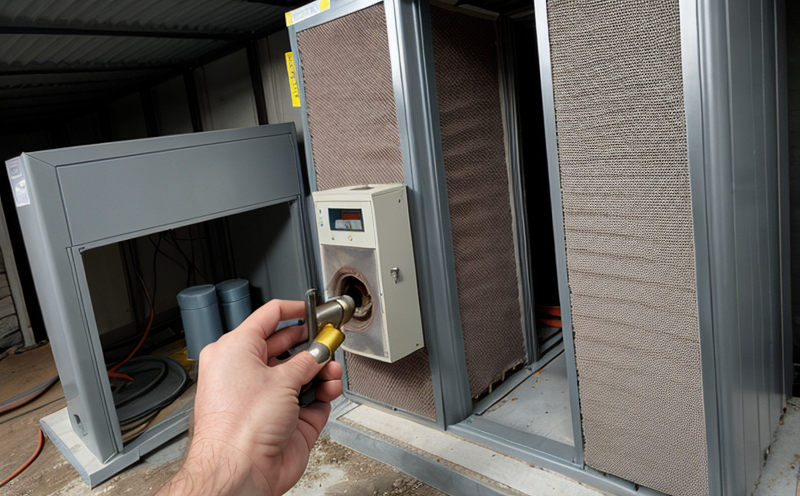Cold weather fabric thermal performance evaluation
The cold weather fabric thermal performance evaluation is a critical assessment that ensures materials used in cold environments are capable of maintaining essential warmth while also providing comfort and functionality. This service evaluates the insulating properties of fabrics under simulated conditions that mimic real-world use, ensuring they meet or exceed specified standards for thermal resistance.
Our testing facility uses state-of-the-art equipment to simulate various environmental factors such as temperature, humidity, and wind speed, which are crucial in understanding how a fabric performs in cold weather. The evaluation process involves careful specimen preparation and exposure under controlled conditions that replicate the intended use of the material.
The primary focus is on determining the thermal resistance (R-value) of the fabric, which measures its ability to resist heat flow through it. This parameter is essential for fabrics used in cold-weather clothing, as they must balance insulation with breathability and moisture management. Our testing can also assess other factors such as air permeability, water vapor transmission rate, and resistance to wind chill.
The process begins with the selection of appropriate specimens that accurately represent the fabric’s intended use. Once prepared, these samples are subjected to a series of tests in our climate-controlled laboratory. The equipment used includes thermal manikins, environmental chambers, and infrared cameras to capture temperature changes across the fabric surface. This data is then analyzed using advanced software to derive accurate R-values and other relevant metrics.
Compliance with international standards such as ISO 20685:2017 for clothing fabrics in cold environments is a key part of our service. Our team ensures that all tests are conducted in accordance with these guidelines, providing results that are both reliable and repeatable. The outcome of this evaluation helps manufacturers ensure their products meet regulatory requirements while also enhancing product performance.
Quality assurance is paramount in the textile industry, especially for cold-weather apparel where comfort and safety are non-negotiable. By offering comprehensive thermal testing services, we provide our clients with peace of mind knowing that their fabrics will perform as expected under real-world conditions. This service not only supports compliance but also contributes to product innovation by providing valuable insights into material behavior.
- Comprehensive evaluation of fabric insulation properties
- Simulated cold weather environments for accurate testing
- Use of advanced thermal manikins and infrared cameras
- Conformance with ISO 20685:2017 standards
In conclusion, the cold weather fabric thermal performance evaluation is essential for any manufacturer looking to produce high-quality, safe, and comfortable cold-weather apparel. By leveraging our expertise in this area, you can ensure that your products meet strict regulatory requirements while also offering superior performance.
Why It Matters
The importance of evaluating the thermal performance of fabrics in cold weather cannot be overstated. In extreme climates, where temperatures drop below freezing, the ability to maintain warmth is not just a comfort issue but also a safety concern. Cold weather clothing must effectively insulate against external heat loss while allowing for moisture management and breathability.
For quality managers and compliance officers, ensuring that fabrics meet specific thermal resistance standards is crucial. Compliance with international standards such as ISO 20685:2017 helps prevent product failures and potential accidents in cold weather environments. R&D engineers benefit from this service by gaining insights into material properties that can improve future designs.
Procurement teams also find value in our testing, as it allows them to source fabrics that meet the highest quality standards. By selecting materials based on their thermal performance data, they can reduce waste and optimize production processes. This not only improves product quality but also enhances the overall consumer experience.
The impact of these evaluations extends beyond individual products; it contributes to broader industry standards and practices. By adhering to rigorous testing protocols, we help drive innovation in cold-weather apparel while maintaining safety and performance standards.
Quality and Reliability Assurance
- Comprehensive Evaluation: Our service provides a thorough examination of fabric thermal properties, ensuring consistent quality across all batches. This helps manufacturers maintain product reliability and customer satisfaction.
- Standard Compliance: All tests are conducted according to international standards such as ISO 20685:2017, guaranteeing that the results are accurate and repeatable.
In our laboratory, we use a range of sophisticated instruments, including thermal manikins, environmental chambers, and infrared cameras. These tools allow us to simulate real-world conditions accurately, providing reliable data on fabric performance.
The process begins with careful specimen preparation to ensure that the tested samples are representative of the final product. Once prepared, these specimens undergo a series of tests in our climate-controlled laboratory. The results are then analyzed using advanced software to derive accurate thermal resistance values and other relevant metrics.
By adhering strictly to international standards, we ensure that all test results are consistent and reliable. This not only helps manufacturers meet regulatory requirements but also enhances product quality and performance. Our commitment to accuracy and reliability is reflected in our clients' trust in the services we offer.
Environmental and Sustainability Contributions
- Eco-friendly Testing: We employ sustainable practices throughout our testing process, minimizing waste and reducing environmental impact.
- Sustainable Materials: Our evaluations support the development of materials that are both functional and environmentally friendly, contributing to a more sustainable textile industry.
The cold weather fabric thermal performance evaluation not only ensures product quality but also plays a role in promoting sustainability. By testing fabrics for their insulating properties, we help manufacturers make informed decisions about material choices, which can lead to the development of eco-friendly alternatives.
Our laboratory is committed to reducing its carbon footprint by optimizing energy use and minimizing waste. This commitment extends beyond our facility to the broader industry, encouraging the adoption of sustainable practices in cold-weather apparel manufacturing.
The evaluation process helps identify materials that offer superior thermal performance while being environmentally responsible. By promoting the use of these materials, we contribute to a more sustainable textile industry, ultimately benefiting both manufacturers and consumers.





